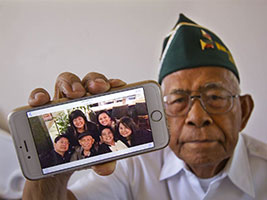
Arturo Caleda, A Filipino WWII veteran, showing a picture of him with his family [via NBC News]
Filipino World War II veterans can now reunite with their children when a new Obama administration immigration policy takes effect.
The policy will allow Filipino World War II Veterans to bring their family members to work and live in the United States.
In the Final Visa Modernization Report publicized by the White House, the new plan called “parole policy” will permit children of the Filipino WWII veterans who are currently in the visa backlogs to come to the U.S under a parole status by requesting a parole- an immigration tool that “allows individuals to come to the U.S. for a temporary period of time on a case-by-case basis based upon urgent humanitarian reasons or significant public benefit.”
This new parole policy, which will be headed by the Department of Homeland Security (DHS) with the cooperation of the United States Citizenship and Immigration Services (USCIS) and the Department of State, is a product of Visa Modernization Task Force, an interagency group created by President Obama last November as a part of his executive actions in improving the U.S. immigration system.
Asia Americans Advancing Justice (AAJC), a non- profit organization also contributed in the attainment of the reunification program by submitting a report last month of detailed recommendation on modernizing the legal immigration system including the granting of parole to the children of Filipino WWII veterans.
91-year-old Arturo Caleda, a Filipino WWII veteran residing in Hawaii who expects his three children to come through the program, shared to NBC News his sentiments regarding the new policy which he considered as a breakthrough.
“I think the president realized that because we are too old now, that we need the help of our children…so that somebody can take care of us while we’re residing in the United States.”
As of now, there are estimated 6,000 Filipino WWII veterans who are still alive and residing in the U.S, hoping for the program’s immediate implementation before the Obama Administration ends.
|
|